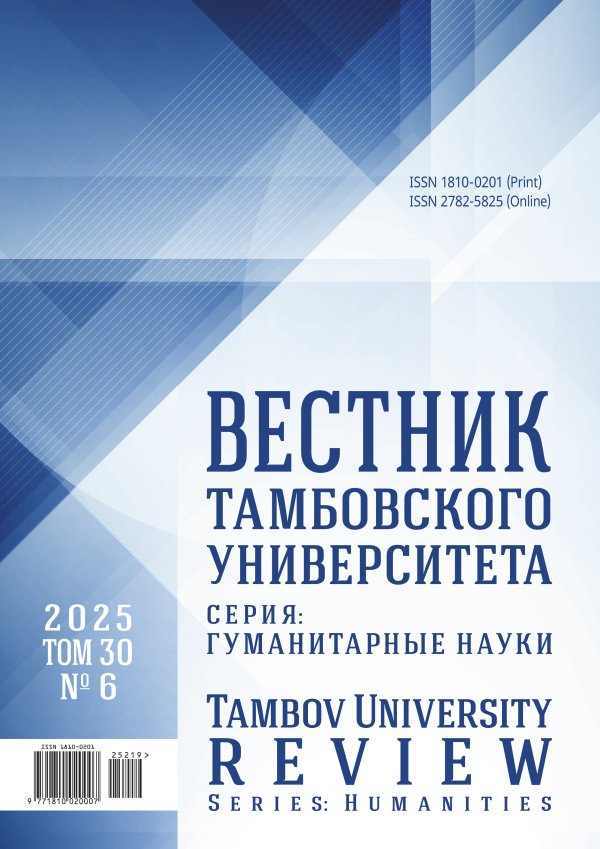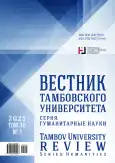Валидация технологии формирования навыков индивидуальной информационной безопасности студентов вуза
- Авторы: Юрченко М.А.1, Бобер А.Е.1, Устименко Я.И.1
-
Учреждения:
- Сибирский институт управления – филиал РАНХиГС
- Выпуск: Том 30, № 1 (2025)
- Страницы: 148-166
- Раздел: ПЕДАГОГИКА ВЫСШЕЙ ШКОЛЫ
- URL: https://bakhtiniada.ru/1810-0201/article/view/297485
- DOI: https://doi.org/10.20310/1810-0201-2025-30-1-148-166
- ID: 297485
Цитировать
Полный текст
Аннотация
Актуальность. Рассмотрена актуальная проблема формирования навыков индивидуальной информационной безопасности у студентов вузов в условиях растущих угроз киберпреступности и дезинформации. Обоснована необходимость интеграции навыков индивидуальной информационной безопасности в образовательный процесс как ключевого компонента медиаграмотности.
Материалы и методы. Использованы системный и культурологический подходы. Проведен анализ результатов первого цикла апробации технологии формирования навыков индивидуальной информационной безопасности у студентов направления «Международные отношения», а также представлены промежуточные итоги второго цикла апробации на направлениях «Реклама и связи с общественностью» и «Менеджмент организации». Применялись педагогический эксперимент, включенное наблюдение, интроспекция и анализ.
Результаты исследования. Анализ результатов семестрового тестирования показал положительную динамику развития навыков ИИБ в экспериментальных группах по сравнению с контрольными. В частности, в одной из экспериментальных групп (ЭГ1) средний балл вырос с 4,72 до 7,9, а в другой (ЭГ2) – с 3,75 до 4,5. Отмечено снижение стандартного отклонения в экспериментальных группах, что свидетельствует о выравнивании уровня компетенции.
Выводы. Результаты исследования подтверждают валидность предложенной технологии формирования навыков индивидуальной информационной безопасности у студентов вузов. Интеграция разработанных методических материалов в образовательный процесс способствует улучшению критической оценки информации, повышению общей медиаграмотности и развитию аналитических компетенций. Приведены перспективы масштабирования технологии на другие уровни образования.
Об авторах
М. А. Юрченко
Сибирский институт управления – филиал РАНХиГС
Email: yurchenko-maa@ranepa.ru
ORCID iD: 0000-0002-6886-7431
кандидат педагогических наук, доцент кафедры иностранных языков и лингводидактики
Россия, 119571, Российская Федерация, г. Москва, пр-кт Вернадского, 82, стр. 1А. Е. Бобер
Сибирский институт управления – филиал РАНХиГС
Email: bober-ae@ranepa.ru
ORCID iD: 0009-0000-6367-4852
преподаватель кафедры иностранных языков и лингводидактики
Россия, 119571, Российская Федерация, г. Москва, пр-кт Вернадского, 82, стр. 1Я. И. Устименко
Сибирский институт управления – филиал РАНХиГС
Автор, ответственный за переписку.
ORCID iD: 0009-0002-3603-9858
преподаватель кафедры иностранных языков и лингводидактики
Россия, 119571, Российская Федерация, г. Москва, пр-кт Вернадского, 82, стр. 1Список литературы
- Ши М. Влияние развития информационного общества на сетевую медиаграмотность студентов // Управ-ление образованием: теория и практика. 2020. № 3 (39). С. 4-10. https://elibrary.ru/netvmr
- Sherzodkhon K. The political socialization of the people in Uzbekistan: media presence and the absence of media literacy // International Journal of Media and Communications in Central Asia. 2024. № 4. Р. 4-19. https://doi.org/10.62499/ijmcc.vi4.26
- Задорин И.В., Сапонова А.В. Сравнительный анализ индексов медиаграмотности в странах Центральной Азии // Коммуникации. Медиа. Дизайн. 2020. Т. 5. № 3. С. 63-89. https://elibrary.ru/jfjfnw
- Seemma P.S., Sundaresan N., Sowmiya M. Overview of cyber security // International Journal of Advanced Re-search in Computer and Communication Engineering. 2018. Vol. 7. Issue 11. P. 125-128. http://doi.org/10.17148/IJARCCE.2018.71127
- Rebelo Trindade A., Marques C.G. Privacy and cyber-security using information systems: a proposal for know-ledge, skills, and attitudes // Proceedings of the 2023 International Conference on Information Technology & Systems. Lecture Notes in Networks and Systems. Cham, Springer. 2023. Vol. 1. P. 109-129. https://doi.org/10.1007/978-3-031-33258-6_11
- Li H. An exploration of information technology security education and training strategies for higher education teaching services // Contemporary Education and Teaching Research. 2023. № 4. Issue 9. Р. 434-439. https://doi.org/10.61360/BoniCETR232014840904
- Soetekouw L., Angelopoulos S. Digital resilience through training protocols: learning to identify fake news on social media // Information Systems Frontiers. 2022. Vol. 26. Р. 459-475. https://doi.org/10.1007/s10796-021-10240-7
- Liventsova E.Yu., Gorchakova O.Yu., Tolstova M.A. The role of generation Z media literacy in confronting the destructive value messages of digital media // Перспективы науки и образования. 2024. № 2 (68). Р. 24-40. https://doi.org/10.32744/pse.2024.2.2, https://elibrary.ru/cpcrty
- Journell W. Unpacking Fake News: an Educator’s Guide to Navigating the Media with Students. New York: Teachers College Press, 2019. 165 p.
- Krutka D.G., Manca S., Galvin S.M., Greenhow C., Koehler M.J., Askari E. Teaching “against” social media: confronting problems of profit in the curriculum // Teachers College Record. 2019. Vol. 121. Issue 14. Р. 1-42. https://doi.org/10.1177/016146811912101410
- Шамигулова О.А. Информационно-просветительская деятельность как условие формирования медиагра-мотности у обучающихся // Современные проблемы науки и образования. 2022. № 6-1. С. 48-59. https://doi.org/10.17513/spno.32259, https://elibrary.ru/fjjtml
- Еркибаева Г.Г., Илларионова Л.П., Ерзакова А.Е. Формирование медиаграмотности на занятии по дисци-плине «Методы работы с текстом» // Вестник Московского государственного областного университета. Серия: Педагогика. 2022. № 4. С. 139-148. https://doi.org/10.18384/2310-7219-2022-4-139-148, https://elibrary.ru/brcfhm
- Мацулева К.С. Создание медиаклассов в школе, как решение проблем с медиаграмотностью школьников // International Journal of Professional Science. 2024. № 1-1. С. 59-65. https://elibrary.ru/retwvj
- Юрченко М.А. Основы критического анализа дискурса в высшей школе // Вестник МГПУ. Серия: Педа-гогика и психология. 2024. Т. 18. № 4. С. 94-109. https://doi.org/10.24412/2076-9121-2024-4-94-109, https://elibrary.ru/wsxqwg
- Авдонина Н.С. Медиатекст как средство формирования медиаграмотности у студентов-журналистов // Письма в Эмиссия.Оффлайн. 2021. № 12. Ст. 3017. https://elibrary.ru/qllsiu
- Юрченко М.А., Бойко Е.Н. От медиаграмотности к индивидуальной информационной безопасности сту-дентов высшей школы // Вестник Алтайского государственного педагогического университета. 2024. № 2 (59). С. 42-49. https://doi.org/10.37386/2413-4481-2024-2-42-49, https://elibrary.ru/vpfvgr
- Lebek B., Uffen J., Neumann M., Hohler B., Breitner M.H. Information security awareness and behavior: a theory-based literature review // Management Research Review. 2014. Vol 37. № 12. Р. 1049-1092. https://doi.org/10.1108/MRR-04-2013-0085
- Rogers R.W. A protection motivation theory of fear appeals and attitude change // Journal of Psychology. 1975. Vol. 91. Issue 1. P. 93-114. https://doi.org/10.1080/00223980.1975.9915803
- Maddux J.E., Rogers R.W. Protection motivation and self-efficacy: a revised theory of fear appeals and attitude change // Journal of Experimental Social Psychology. 1983. Vol. 19. Issue 5. P. 469-479. https://doi.org/10.1016/0022-1031(83)90023-9
- Sommestad T., Karlzén H., Hallberg J. A meta-analysis of studies on protection motivation theory and informa-tion security behavior // International Journal of Information Security and Privacy. 2015. Vol. 9. Issue 1. Р. 26-46. http://doi.org/10.4018/IJISP.2015010102
- Ajzen I. The theory of planned behavior // Organizational Behavior and Human Decision Processes. 1991. Vol. 50. Issue 50. Р. 179-211. https://doi.org/10.1016/0749-5978(91)90020-T
- Sommerstad T., Karlzen H., Hallberg J. The theory of planned behavior and information security policy com-pliance // Journal of Computer Information Systems. 2017. № 59 (4). Р. 344-353. https://doi.org/10.1080/08874417.2017.1368421
- Fisher J.D., Fisher W.A. Changing AIDS-risk behavior // Psychological Bulletin. 1992. Vol. 111. Issue 3. Р. 455-474. https://doi.org/10.1037/0033-2909.111.3.455
- Crossler R.E., Bélanger F. The mobile privacy-security knowledge gap model: understanding behaviors // Pro-ceedings of the 50th Hawaii International Conference on System Sciences. 2017. Р. 4071-4080. http://doi.org/10.24251/HICSS.2017.491
- Farooq A., Jeske D., Isoaho J. Predicting students’ security behavior using information-motivation-behavioral skills model // 34th IFIP International Conference on ICT Systems Security and Privacy Protection (SEC). Lis-bon, 2019. Р. 238-252. https://doi.org/10.1007/978-3-030-22312-0_17
- Owen-Smith P. The contemplative mind in the scholarship of teaching and learning // Scholarship of Teaching and Learning. Indiana, Indiana University Press, 2018. 208 p. https://doi.org/10.2307/j.ctt200616w
- Ergas O. Mindfulness in, as and of education: three roles of mindfulness in education // Journal of Philosophy of Education. 2019. Vol. 53. Issue 2. Р. 340-358. http://doi.org/10.1111/1467-9752.12349
- Kartashova V.N., Volynkina N.V., Arkhangelskaya N.N. Foreign language information media resources selection for future teachers’ media literacy development: basic principles // Перспективы науки и образования. 2023. № 1 (61). Р. 76-89. https://doi.org/10.32744/pse.2023.1.5, https://elibrary.ru/sbaciw
- Ergas O. A contemplative turn in education: Charting a curricular-pedagogical countermovement // Pedagogy, Culture & Society. 2019. Vol. 27. Issue 2. Р. 251-270. http://doi.org/10.1080/14681366.2018.1465111
Дополнительные файлы










